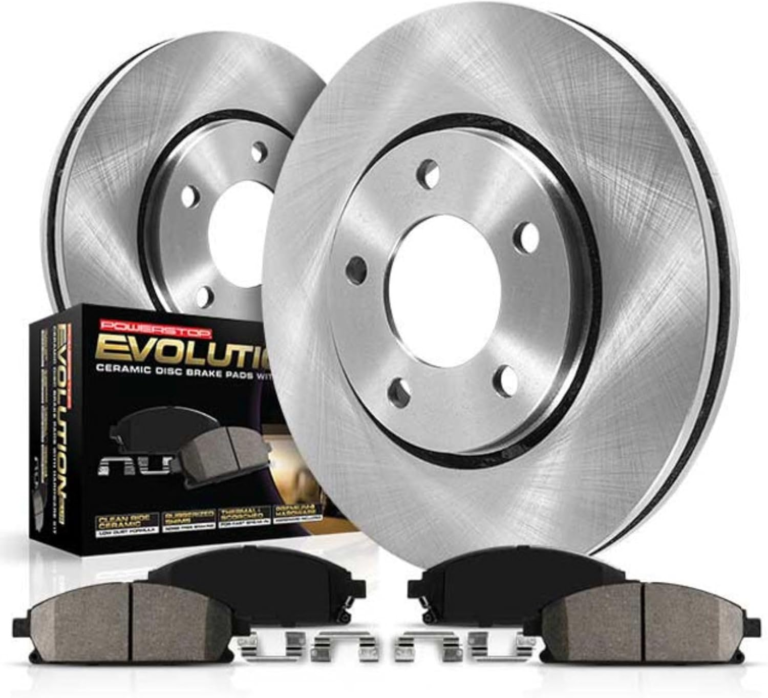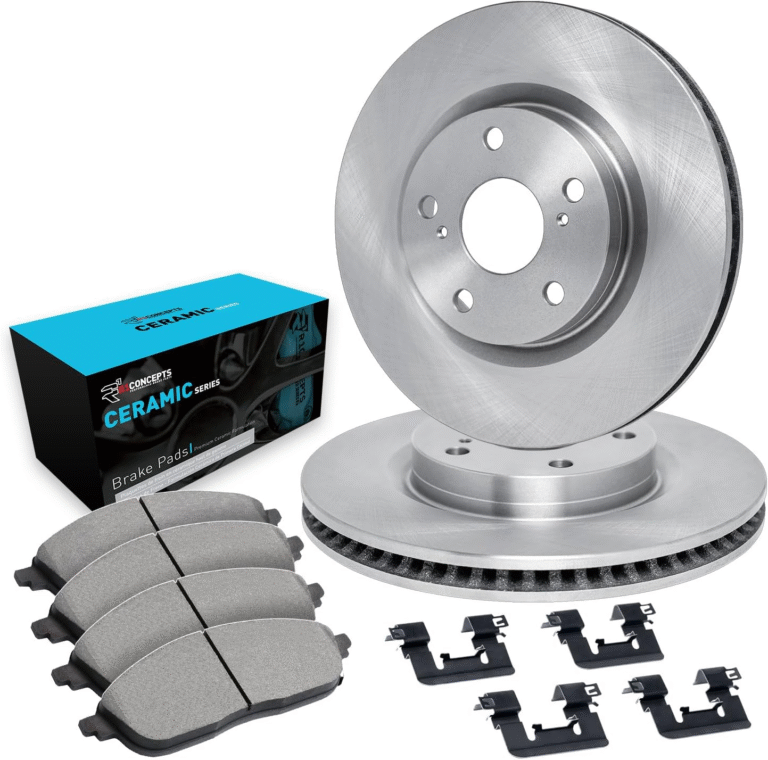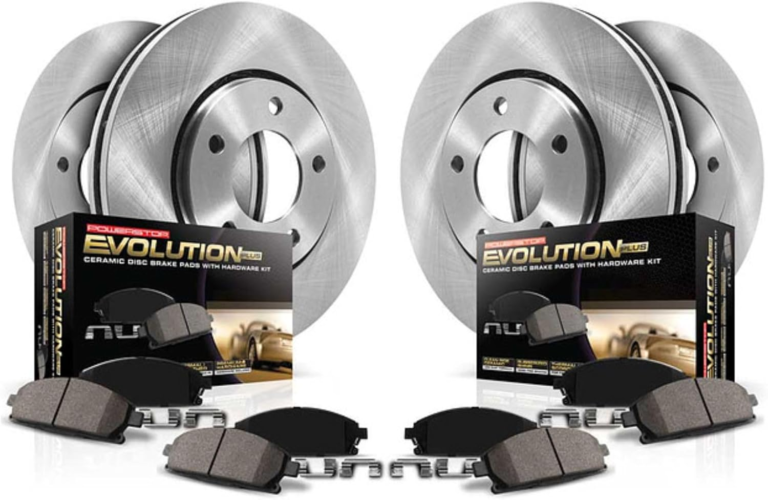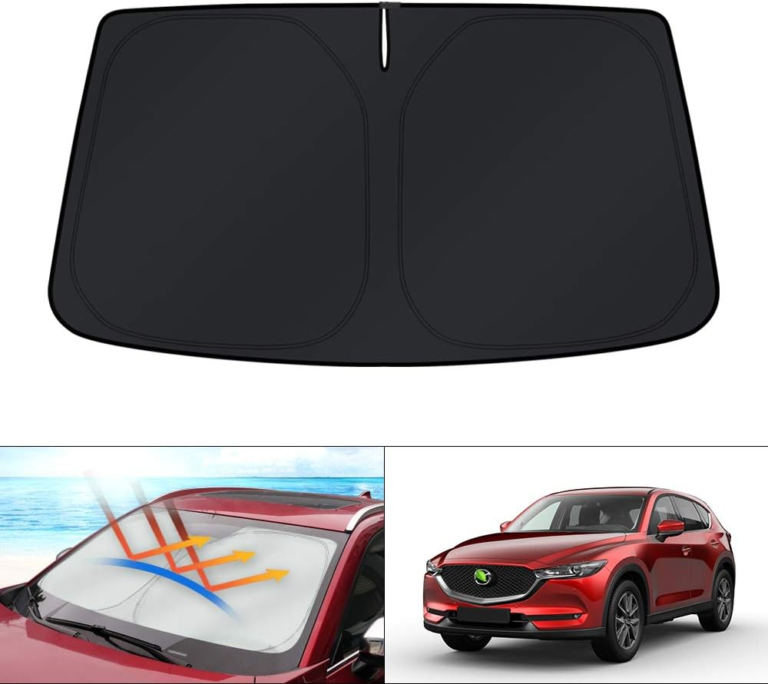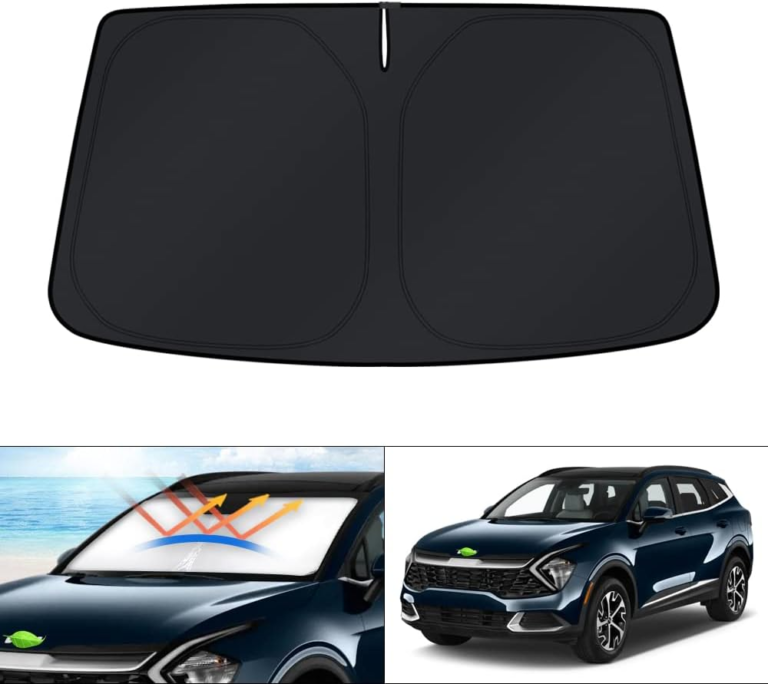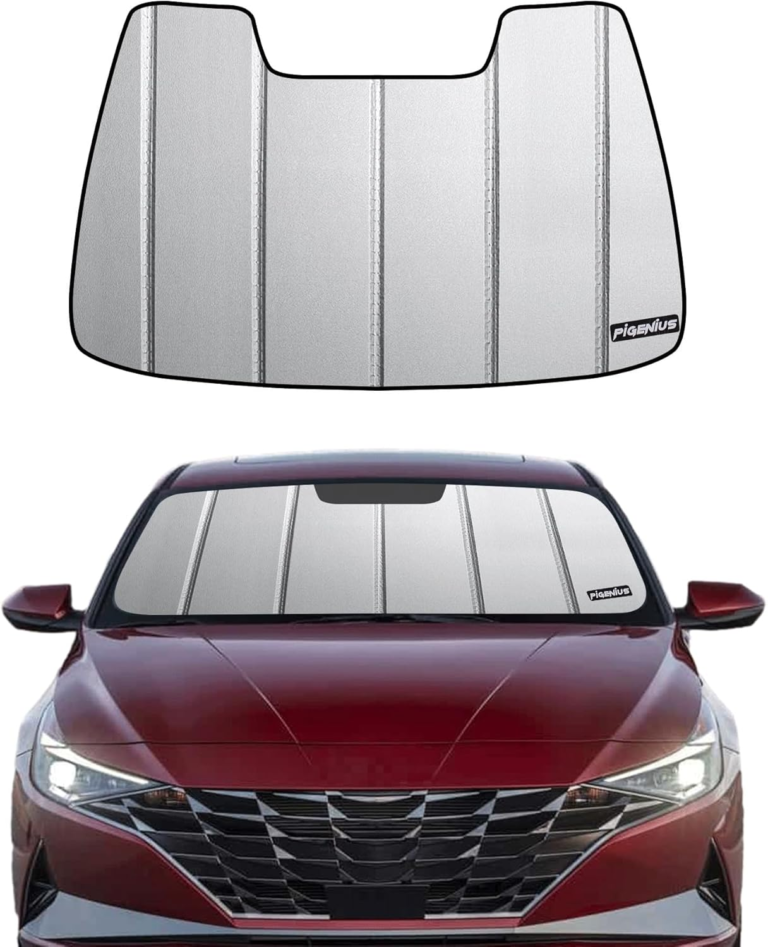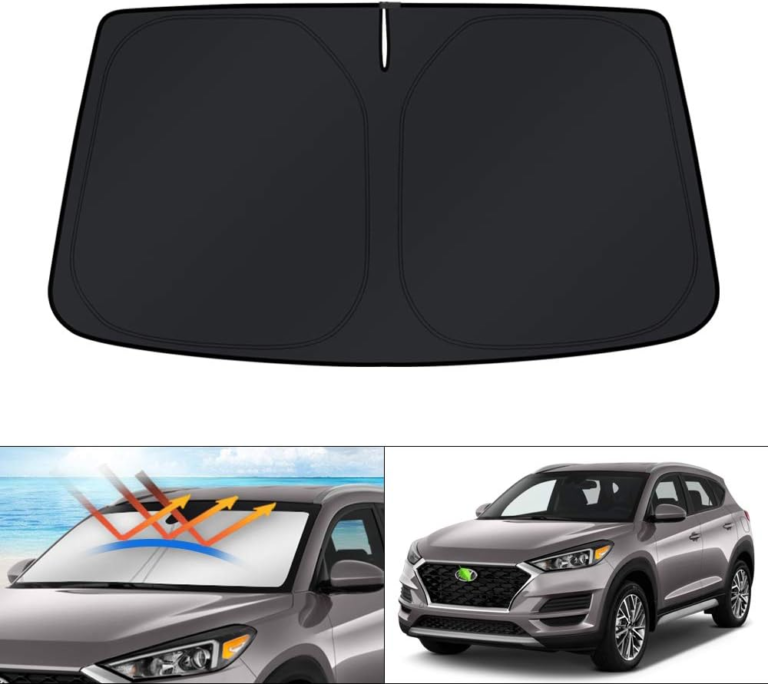Brake rotors (also known as brake discs) are an essential part of your vehicle’s disc brake system. They are flat, circular metal components that work in conjunction with the brake pads to slow down or stop the vehicle when you apply the brakes.
Looking for a replacement Brake Rotors for your Nissan Rogue?
Brake rotors are crucial components of your braking system, and their condition directly impacts your vehicle’s stopping performance. Regular inspection of both the rotors and pads will help maintain your vehicle’s braking efficiency and safety. If you’re unsure whether the rotors need to be replaced or just resurfaced, it’s a good idea to consult a professional mechanic to avoid compromising braking safety.
01. Best Overall: A-Premium Front & Rear Disc Brake Rotors

4.7 out of 5 Ratings
- Compatible with Nissan Rogue 2017, Rogue 2016 L4 2.5L (Built In USA), Rogue 2014-2015 L4 2.5L—Except 3rd Row Seating
- [Reference Number]: The A-Premium Vented Disc Brake Rotors’ reference number: R-31512,R-31512 + Disc Brake Pads’ reference number: P-1737, P-905—Fit for Front and Rear, Driver and Passenger Side. Please enter your vehicle information in the top left corner of listing.
- [Package Details]: 4x Vented Disc Brake Rotor + 8x Disc Ceramic Brake Pads + Brake Lubricant (High-temperature Grease) + Installation Hardware. Complete kit purchase for more time-saving and peace of mind.
02. Best Runner Up: Power Stop Brake Kit
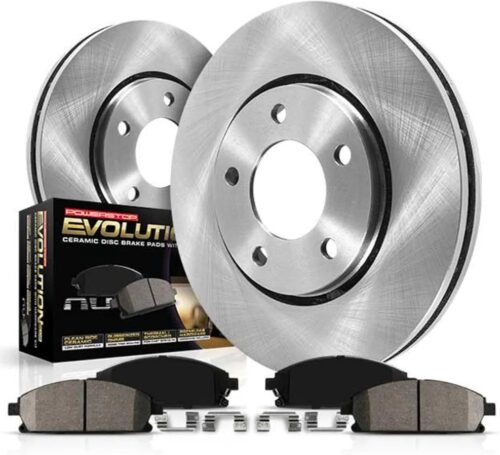
4.7 out of 5 Ratings
Power Stop Brake Kit For 2011 – 2024 Nissan Leaf | 2014 – 2020 Nissan Rogue | 2017 – 2022 Rogue Sport
- Components within this brake kit are designed to work together to maximize stopping power and long-lasting performance as an OE, stock replacement
- Z17 Evolution brake pads ceramic formula offers durable, reliable stopping power that out-performs OE and resists brake dust & noise
- Autospecialty OE Stock Replacement rotors restore the original rotor performance of your vehicle as an easy, bolt-on replacement
- This complete brake replacement kit comes with everything you need and is ready for quick, easy bolt-on installation with no modifications necessary
- Brake Kit has a 24 Month / 24,000 Miles Warranty
03. Best Runner Up: BOSCH Disc Brake Rotor

4.6 out of 5 Ratings
BOSCH 40011604 QuietCast Premium Disc Brake Rotor – Compatible With Select Nissan Rogue
Bosch QuietCast is a name you can depend on, with minimum tolerance levels and innovative materials that ensure the very highest quality and brake judder, noise, vibration, and harshness free operation. All QuietCast rotors are factory mill precision balanced, which disperses the weight evenly, and allows for smooth, safe stops with no pedal pulsation. Superior performance is ensured by OEM style vane configurations that provide more efficient heat dissipation, reduced vibration for quieter operation, and extended rotor life. Aluminum/Zinc coating protection prevents rust and corrosion, extending the life of the rotor while providing a clean look for today’s open wheels.
04. Best Value Pick: POWERSTOP Replacement Brake Pad and Rotor
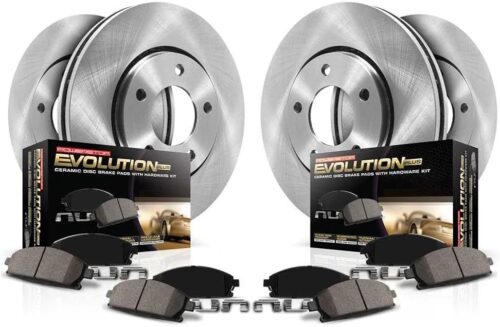
4.6 out of 5 Ratings
POWERSTOP Front and Rear KOE8816 Stock Replacement Brake Pad and Rotor Kit Autospecialty For Nissan Rogue 2021-2023
- Replacement brake kit is recommended for drivers looking to refresh their daily driven vehicle’s stopping power back to OE, stock performance
- Components within this brake kit are designed to work together to maximize stopping power and long-lasting performance as an OE, stock replacement
- Evolution brake pads ceramic formula offers durable, reliable stopping power that out-performs OE and resists brake dust & noise
- Autospecialty OE Stock Replacement rotors restore the original rotor performance of your vehicle as an easy, bolt-on replacement
- This complete brake replacement kit comes with everything you need and is ready for quick, easy bolt-on installation with no modifications necessary
05. Editor’s Pick: Power Stop Brake Kit

4.7 out of 5 Ratings
Power Stop Brake Kit For 2011 – 2024 Nissan Leaf | 2014 – 2020 Nissan Rogue | 2017 – 2022 Rogue Sport
- Stock Replacement brake kit is recommended for drivers looking to refresh their daily driven vehicle’s stopping power back to OE, stock performance
- Components within this brake kit are designed to work together to maximize stopping power and long-lasting performance as an OE, stock replacement
- Evolution brake pads ceramic formula offers durable, reliable stopping power that out-performs OE and resists brake dust & noise
- Autospecialty OE Stock Replacement rotors restore the original rotor performance of your vehicle as an easy, bolt-on replacement
- This complete brake replacement kit comes with everything you need and is ready for quick, easy bolt-on installation with no modifications necessary
Conclusion:
How Do Brake Rotors Work?
When you press the brake pedal, hydraulic pressure is applied to the brake calipers, which then clamp the brake pads onto the brake rotors. The friction generated between the brake pads and rotors slows the rotation of the wheels and, ultimately, the vehicle. Here’s how it works:
- Calipers clamp onto the pads: The brake calipers squeeze the brake pads against the brake rotor.
- Friction slows the rotor: The pads create friction as they press against the rotor, which slows the spinning of the rotor.
- Slows or stops the vehicle: As the rotor slows down, the wheels do too, ultimately bringing the car to a stop.
Types of Brake Rotors
There are several types of brake rotors, each with different characteristics, depending on the type of driving and performance needs:
- Solid Rotors:
- These are the most common type found on everyday vehicles. They are a single piece of metal and are used for normal driving conditions.
- Vented Rotors:
- These rotors have internal vanes (or channels) that allow air to flow through them, improving heat dissipation. Vented rotors are more effective in high-performance situations (like towing or high-speed driving) as they help prevent overheating.
- Slotted Rotors:
- These rotors have grooves or slots on the surface that help clear debris and gases from the brake pad surface. They also improve braking performance in wet conditions, as they channel water away from the pad and rotor.
- Drilled Rotors:
- Drilled rotors have holes drilled through the rotor, which allows for better heat dissipation and improves braking performance. However, they can be more prone to cracking under extreme heat, so they’re often found in performance or racing vehicles.
- Slotted and Drilled Rotors:
- These combine both slotted and drilled designs to maximize performance, heat dissipation, and brake pad grip, though they can be more expensive and prone to wear compared to solid rotors.
Signs Your Brake Rotors May Need to Be Replaced:
- Vibration or Pulsation:
- If you feel the steering wheel or brake pedal pulsating or vibrating when braking, it could be a sign that the rotors are warped or unevenly worn.
- Noise:
- Squeaking or grinding noises can indicate that your brake pads are worn down to the metal or that the rotors are damaged. If it’s a grinding sound, the rotors may be scored, requiring resurfacing or replacement.
- Visible Damage:
- Inspect the rotors for deep grooves, cracks, or rust. Rotors with these issues may need to be replaced.
- Reduced Braking Performance:
- If your car takes longer to stop than usual, or if braking feels less responsive, it could be due to damaged or worn-out rotors.
- Brake Pad Wear:
- If your brake pads are wearing unevenly or excessively, it could be a sign that the rotor surface is uneven, which affects how well the pads can grip.
Can You Just Replace the Brake Pads?
Sometimes, the brake pads may need replacing, but the rotors are still in good shape and don’t need to be replaced. However, if the rotors are warped, scored, or excessively worn, they may need to be either resurfaced (if the damage is minor) or replaced entirely. It’s a good idea to inspect the rotors whenever you replace brake pads.
If the rotors are within the manufacturer’s minimum thickness specification and don’t have any significant wear or damage, you may just need to replace the brake pads and not the rotors.
How to Tell If Your Rotors Need Resurfacing or Replacing:
- Resurfacing: If the rotors are slightly worn or have superficial grooves, a mechanic may be able to machine them (resurface them) to smooth the surface. However, there’s a limit to how many times this can be done, as the rotors need to maintain a minimum thickness to function safely.
- Replacement: If the rotors are significantly warped, cracked, or worn below the minimum thickness, they should be replaced.
When Should You Replace the Rotors?
It’s recommended to replace your brake rotors if:
- They are warped or cracked.
- The braking surface is scored (deep grooves or uneven wear).
- The rotors have worn down to or below the minimum thickness specification (which you can usually find stamped on the rotor or in the vehicle’s service manual).
